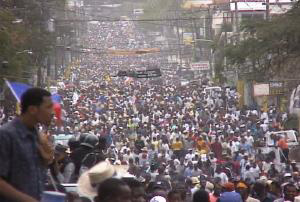DominionSections
Browse Articles
- IndependentMedia.ca
- MostlyWater.org
- Seven Oaks
- BASICS Newsletter
- Siafu
- Briarpatch Magazine
- The Leveller
- Groundwire
- Redwire Magazine
- Canadian Dimension
- CKDU News Collective
- Common Ground
- Shunpiking Magazine
- The Real News
- Our Times
- À babord !
- Blackfly Magazine
- Guerilla News Network
- The Other Side
- The Sunday Independent
- Vive le Canada
- Elements
- ACTivist Magazine
- The Tyee
- TML Daily
- New Socialist
- Relay (Socialist Project)
- Socialist Worker
- Socialist Action
- Rabble.ca
- Straight Goods
- Alternatives Journal
- This Magazine
- Dialogue Magazine
- Orato
- Rebel Youth
- NB Media Co-op
Radio
Media Coverage of Haiti Flawed: Analysts
February 25, 2004
Media Coverage of Haiti Flawed: Analysts

Between 100,000 and 1 million Haitians gather for Feb. 7 a demonstration in support of President Aristide finishing his five year term. Associated Press and Reuters reported "thousands" and "tens of thousands". photo: Haiti Information Project
In those same weeks, a number of Haitian activists, journalists and media analysts have cried foul, claiming that the media has presented half-truths and outright lies in their coverage of the situation in Haiti.
US Support of "Opposition" Ignored
Almost universally missing from media coverage of Haiti, some critics say, is information about US Government support for the "opposition", a collection of political parties extremely hostile to the government of Haitian President Jean Bertrand Aristide. "This opposition was founded and continues to operate with the full, if not always open, support of the United States," writes Jessica Leight of the Council on Hemispheric Affairs. Millions of US taxpayers' dollars have gone to fund the "Convergence Democratique," a coalition of opposition groups that have denied the legitimacy of Aristide's presidency since his election.
"Groups of former Haitian military have received arms, training and shelter within the Dominican Republic with the clear knowledge of US authorities," according to the Haiti Information Project (HIP), a California-based non-profit. Documentary filmmaker Kevin Pina has noted that paramilitary soldiers have been seen carrying brand new M-16s, while the Dominican Republic (where many of the paramilitaries are coming from) recently received a military aid shipment containing 20,000 US-made M-16s.
History of "Opposition" Obscured
As early as Aristide's 2001 inauguration as President, the Convergence Democratique was already implementing a "parallel government," says Stan Goff, an American writer who was in Haiti observing the 2001 elections. Aristide won with 92 per cent of the vote, but the opposition presented him with an "offer" to share the Presidency with two members of the Convergence.
"The corporate media has neglected to mention that the 'opposition' to which they refer and repeatedly give legitimacy to, only represents a meager 8 per cent of registered voters in Haiti, according to a US poll," writes Anthony Fention, a Vancouver-based writer and media analyst. Other sources have placed the opposition's share of popular support at 12 per cent.
Paradoxically, some say, the opposition has more support from the media than Aristide. "Far from being silenced," says HIP, "opposition politicians dominate the media in Haiti; wealthy Haitians who do not support Aristide own most stations and newspapers and Convergence members are often interviewed on government-run Haitian National Television."
Aristide's Accomplishments, Popularity Not Covered
Opposition and paramilitary leaders are often quoted as calling Aristides' government "totalitarian" and willing to use violence to crush the opposition. The Haiti Information Project argues that the mainstream media systematically ignores the accomplishments of the Aristide-led government in favour of this image of a once-popular president-turned-dictator.
Among Aristide's accomplishments, says HIP, are the disbanding of the military, the building of more schools between 1994 and 2000 than were built in the preceding century, the doubling of the minimum wage, and the creation of new health care programs.
Many analyses have noted that most media accounts perpetuate the image of a "defiant" Aristide who has lost his mandate. The HIP web site features photographs of tens of thousands of people attending a pro-Aristide rally on Jan. 1. Also featured is an excerpt from a New York Times articles that describes the same rally as a "small but enthusiastic crowd". Other articles note an inflation of small opposition rallies into "thousands" of apparent demonstrators by the Economist and the Wall Street Journal.
Background
200 years ago, thousands of Haitian slaves staged a successful armed revolt against a much larger French occupying force, becoming the first and only successful revolution of enslaved people. The United States, which made use of slavery at the time, led a 50 year boycott against the nascent republic.
Having endured a number of US-supported military dictatorships, mass murder of dissidents by the military, and a crushing foreign debt, Haiti is today the poorest country in the Western Hemisphere.
Re-elected for a second five-year term in 2001, President Aristide has struggled to balance violent opposition groups, poverty, and demands from the International Monetary Fund to cut spending. Faced with a 70 per cent unemployment rate and a dependence on foreign aid, Haiti suffered from a US-imposed embargo on foreign aid money in 2000.
A 1996 report by the US National Labour Committee revealed that Haitian workers were producing "Mickey Mouse" and "Pocahontas" pajamas for less than 12 cents an hour (USD). Despite "active pressure" from the United States Agency for International Development (USAID), to not increase wages, Aristide's government has since doubled the minimum wage to about 4 US dollars per day.
Related articles:
By the same author:
Archived Site
The Dominion is a monthly paper published by an incipient network of independent journalists in Canada. It aims to provide accurate, critical coverage that is accountable to its readers and the subjects it tackles. Taking its name from Canada's official status as both a colony and a colonial force, the Dominion examines politics, culture and daily life with a view to understanding the exercise of power.